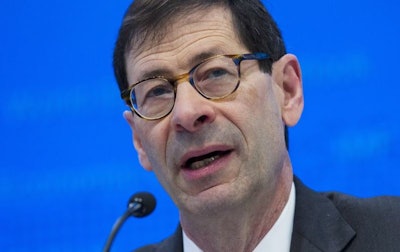
The world economy is picking up momentum.
The International Monetary Fund on Tuesday raised its forecast for global growth to 3.6 percent this year and 3.7 percent in 2018. For both years, the outlook is up 0.1 percentage points from the IMF's previous forecast in July and would mark the fastest growth since 2010. The world economy grew 3.2 percent in 2016.
Just a year ago, the global economy was still stuck in a slump in the aftermath of the Great Recession of 2007-2009 and a debt crisis in Europe. China's economy was slowing steadily, raising fears of economic fallout in the developing countries that supply raw materials to the world's second biggest economy.
Now the global recovery appears widespread — three-quarters of the globe is enjoying an upswing for the first time this decade — and many of the fears have eased.
The United States, the 19-country eurozone, Japan and China are all forecast to grow faster this year.
World trade is expected to grow 4.2 percent this year, the most in six years.
IMF chief economist Maurice Obstfeld said the sunnier outlook for the United States — 2.2 growth this year versus 1.5 percent in 2016 — did not include any expectations that the U.S. Congress will pass big tax cuts and just reflected healthy U.S. growth in the first half of 2017.
A pickup in investment, industrial production and consumer and business confidence also underpins the improved global outlook.
But lackluster productivity growth and aging populations continue to drag on growth in the world's wealthiest countries. The international lending agency also notes that inflation remains worryingly low, a sign that the world economy still has not returned to full health in the aftermath of the Great Recession of 2007-2009.
China is expected to report faster growth this year for the first time since 2010, easing about collateral damage elsewhere. But the IMF warns that China has taken on high debts to juice growth and advised Chinese authorities to continue a recent effort to limit growth in credit.
In an indirect reference to the election of President Donald Trump in the United States and Britain's decision to leave the European Union, chief economist Obstfeld also warned that growing income inequality within countries has "helped fuel political disenchantment" and a backlash against globalization.






















